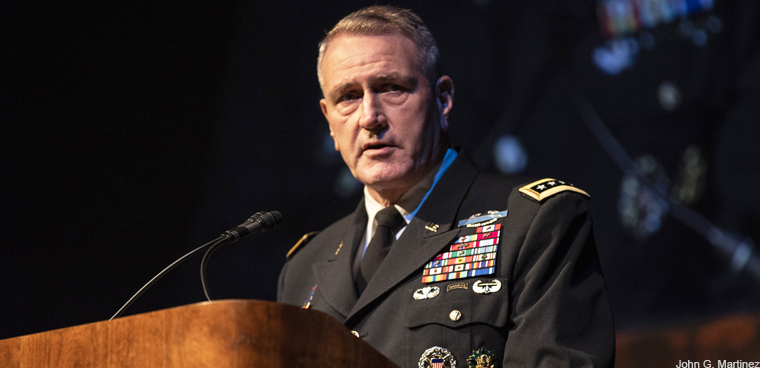Army Futures Command staffed up, plans small business office
Army Futures Command will hit full operating capacity July 31 and will start focusing on courting small businesses in hopes of connecting to the latest tech.

Gen. John M. Murray, Army Futures Command commanding general, at the Association of the U.S. Army's Global Force Symposium in Huntsville, Ala., March 26, 2019. (Photo Credit: Mr. John G. Martinez)
Army Futures Command will hit full operating capacity July 31 and turn its attention to courting small businesses in hopes of tapping into the latest technology.
AFC Commander Gen. John Murray announced the modernization command has met most of its staffing needs after bringing on 24,000 civilian and military personnel and absorbing several Army organizations -- just one year after making Austin, Texas, its headquarters. More growth is expected, with a new small business center planned for AFC’s headquarters.
“Small businesses are key to our success,” Murray said in a July 18 Pentagon news briefing.
Murray told reporters the small business office in AFC headquarters will help "make sure that we are at least knowledgeable if not capitalizing on all that small business can offer.” The command is currently hiring someone to lead that effort, he said.
In a July 17 report, the Government Accountability Office recommended AFC coordinate with other Army organizations to track small business engagement and set up a dedicated pathway to formally coordinate roles and responsibilities for working with small firms. Murray said he agreed with GAO’s findings, saying “it’s going to take a combination of both” small and large businesses to meet the Army’s tech needs.
Murray also said the Army Applications Laboratory would be integral to AFC’s small business goals, primarily serving as point for figuring out warfighter needs, including recoding mission command systems and integrating virtual reality into pilot training and autonomous resupply into artillery units.
Working with the University of Texas, AFC is building out a robotics laboratory and researching battery and energy storage as well as assured positioning, navigation and timing. With Texas A&M, AFC's focus areas are hypersonics and directed energy research along with plans to build a soldier development center where warfighters can connect directly with researchers.
Additionally, AFC plans to host a matchmaking event where defense prime contractors can network with small businesses. (DOD Acquisition and Sustainment has been working on a similar arrangement with vendors and venture capitalists.) Army acquisition head Bruce Jette said the Pentagon would support and coordinate with AFC’s small business efforts.
With so much change around Army acquisition, Murray told reporters, the biggest challenge is making the Army acquisition culture less risk-averse.
“I’m not interested in changing the Army’s culture,” he said, but rather in "getting everybody focused on a single output as opposed to individual output.” With many new organizations now under Army Futures Command, all of which come with their own cultures, Murray said it will take time, but AFC is “on the road to get there.”
NEXT STORY: GAO again warns of risks in 2020 census






